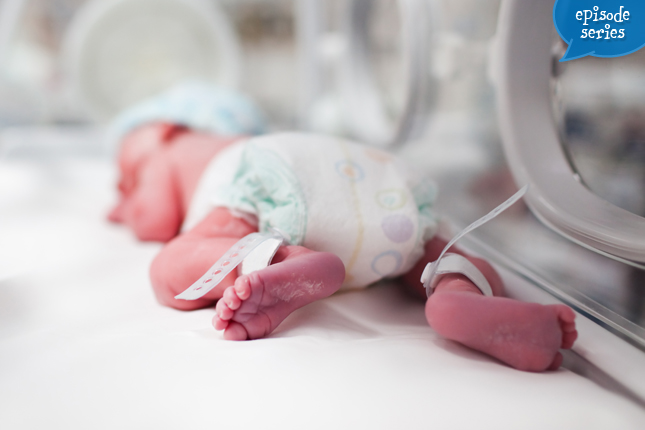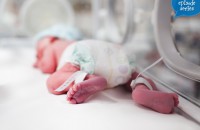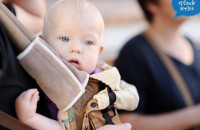Twin Talks
Inside the NICU: Follow-Up and Outpatient Care
[00:00:00]
Please be advised, this transcription was performed from a company independent of New Mommy Media, LLC. As such, translation was required which may alter the accuracy of the transcription.
[Theme Music]
KARYN QURAISHY: Having a baby in the Neonatal Intensive Care Unit can be quite overwhelming experience. And while parents of twins may be counting the days until they can take their baby home, there’s still much to consider once the babies leave the hospital. I’m Karen Quraishy, a pediatric physical therapist who works in the NICU at Tri City Medical Centre. And today, we’re talking about follow up and outpatient care after your twins are released in the NICU. This is Twin Talks.
[Theme Music/Intro]
SUNNY GAULT: Welcome to Twin talks, broadcasting from the birth education centre of San Diego. Twin Talks is your weekly online on the go support group for expecting and new parents of twins. I’m your host Sunny Gault. Have you heard about the Twin Talks club? Our members get bonus content after each new show, plus special giveaways and discounts.
You can subscribe to our Twin Talks newsletter and learn about the latest episodes available. And another great way for you to stay connected is by downloading our free Twin Talks app it’s available on the Android, IOS and Windows Phone. And I should say, I’m actually guest hosting today, because Christine, our host is celebrating her birthday so you know we thought we give her the day off.
[Theme Music]
SUNNY GAULT: So before we get started today, I wanted to talk about an article that I found online which I found absolutely amazing. We don’t have any panellist today but I asked Karen, our expert to chat with me a little bit about this topic.
This is from ABC news, and the headline is: Quadruplet mom to be has emergency surgery to save babies. This is pretty amazing. The mom, her name is Ashley, and she made headlines originally when she got pregnant. She and her husband had been getting some fertility treatments and trying really hard to have a baby and they end up implanting two embryos.
And both of those embryos ended up splitting resulting in two sets of identical twins. And so she’s making the headlines again because she needed to have some emergency surgery. She was in her nineteenth week of pregnancy and doctors found evidence of twin to twin syndrome. And that’s basically when there’s an imbalance in the blood supply between a set of identical twins in the placenta. And so they needed to go in and get the babies out early. And according to doctors the surgery was a success, we haven’t heard if all the babies made it.
As you can imagine, nineteen weeks the babies were pretty small. This article actually doesn’t give a lot of details about the size of the babies but we do know, this is just amazing that a mom was able to conceive identical twins, two sets of identical twins at once. We know that’s a one in seventy million chance that that could happen. So, Karen I love to have your take on this as someone who has been in the NICU. Have you seen even quadruplets before?
KARYN QURAISHY: I have never seen quadruplets in the NICU before. We’ve had triplets in there before
SUNNY GAULT: Okay
KARYN QURAISHY: But I’ve never, I’ve never even heard of the, you know having two sets of twins and both being identical, that’s pretty amazing, that’s pretty nice
SUNNY GAULT: Oh my gosh. What usually happens even in a triplet situation? Is it usually fraternal, is there sometimes an identical set and then a fraternal twin?
KARYN QURAISHY: It can be either way, we’ve had both things in there where there’s two that are identical twins and then one separate that’s a part of the triplets
SUNNY GAULT: Okay
KARYN QURAISHY: So I’ve never seen three identical triplets, though either
SUNNY GAULT: Oh my goodness. That’s crazy. And even with triplets would you have seen, I know you say you haven’t seen quadruplets before but, you’re talking about really small babies usually when they come out right?
KARYN QURAISHY: Yeah most of the triplets that we’ve had have been under two pounds. So they are very small
SUNNY GAULT: Oh my gosh. So I would imagine with quadruplets, they’re even tinier than that. Yeah. And at nineteen weeks
KARYN QURAISHY: Nineteen weeks, it’s hard to tell
SUNNY GAULT: Oh my goodness. Well we certainly wish the best for this mom and hopefully all the babies made it. I just think that it’s amazing that this happened in the first place so. Ashley if you’re listening out there, congrats on your babies and we hope you’re doing well
[Theme Music]
SUNNY GAULT: Today we’re continuing our series that takes a closer look at what happens inside the NICU. And this episode is about what happens when you’re babies sleep in the NICU and then start receiving outpatient care. Our expert is Karen Quraishy, she is a physical therapist in the NICU at Tri City Medical Centre which is right here in the San Diego area. So, Karen welcome to Twin Talks
KARYN QURAISHY: Thank you, it’s great to be here
SUNNY GAULT: Yes, so let’s talk a little bit about the discharge process. So, what criteria is used to determine whether it’s one baby, two babies because you may not have both your babies in the NICU maybe only one baby needed it, right? So what is the discharge process like?
KARYN QURAISHY: Our discharge process consists of several different things. The criteria that we have that we go by, that most NICU’s go by is first the baby must be able to breathe on their own independently. We also make sure that the baby can maintain their temperature. So this means if they were in an isolate they have to be able to maintain their temperature and actually come out of that to be on what we would call an open crib.
They may be must have to be able to take all their feeds by mouth whether it’s breastfeeding which is what we prefer or by the bottle. And then once they were able to do that, they also have to show that they can gain weight every day. So once they’re full in taking their full feeds by mouth, we’ll keep them for another day or two until we know that they’re gaining weight followed by taking these feeds by themselves
SUNNY GAULT: Okay. And so if they meet all of those obligations or that set of criteria, then they’re probably going to be discharged.
KARYN QURAISHY: Yes. They will be, within a day or two they will be discharge and it’s not uncommon for us to have twins that are discharged on two different dates. As much as we would like to see them discharged together, it’s very rare. Most of the time one baby will go home and then a few days later the next baby will go home
SUNNY GAULT: Now does that have anything to do, because I can imagine as a new parent there’s still a lot of stuff to consider once you bring your babies home. Is part of that for the benefit of the parent or is it really more just, will this baby needed a little bit more care than the other baby?
KARYN QURAISHY: It’s just because one baby needs a little more care. It just hasn’t met the feed as fast as the other one. Usually once just a little stronger and gets to that full feed sooner and so that one would go home first
SUNNY GAULT: Okay. Okay, is there anything, I don’t think you mentioned anything regarding weight? Is there a weight?
KARYN QURAISHY: Not anymore. There used to be a long time ago. But No, now there’s none
SUNNY GAULT: What’s the smallest weight that you’ve seen a baby go home?
KARYN QURAISHY: probably around five pounds
SUNNY GAULT: Okay
KARYN QURAISHY: They like them to be over five pounds when they go home
SUNNY GAULT: Okay. When parents are in the NICU, we’ve done a couple of different episodes already where you know NICU parents have you know talked about what the environment was like. And there’s a lot of machines and a lot of beeping going on and there’s a lot of stuff happening right to care for babies. And I would imagine even though the babies are able to do, you know quite a bit of things before they leave they’re still may need to be training that happens before they go home. You know, is there any ever equipment that goes home with them? Can you kindly shed some light? I know it’s a general question, but what typically happens?
KARYN QURAISHY: Typically, by the time the baby leaves we don’t send any equipment with them anymore. And what we like is within the last forty eight hours prior to discharge is that they are still going to be on monitors while they’re there in the hospital. But the parents aren’t going to be really looking at the monitors, the parents are going to be taking care of the babies so that their pretty secure when they go home.
So we don’t really send any equipment home with the babies. Because a lot of education that’s given to them prior to discharge. They’re required to watch specific videos. We have videos that they have to watch regarding safe sleep, shaking baby, CPR. There’s a car seat safety video, breastfeeding videos. And if they’re first time parent, they’ll actually watch a video on baby basics.
They’re given a discharge packet, and this discharge packet will give them information that they need regarding car seat safety. And there’s actually a list in there where they can take their car seat to different places to make sure that they feel, that the car seats are installed safely in the car. They also get information regarding safety sleep or back to sleep program to prevent sids.
And then depending on the baby, certain babies will get hearing screens. It also, it depends on what your baby required while they’re in there the NICU, if you saw the occupational therapist. The occupational therapist will give you something regarding feeding when they get discharged.
The physical therapist will give you information regarding development and adjusting the age of the baby. So if the baby was born premature, if they were born say two months premature at thirty two weeks, when you take your baby home. You’re not going to really want to think of your baby as a one month old baby, you’re really going to want to think of your baby as not being born yet.
So there’s ways that we have to adjust the age. If they qualify for our clinic they’ll get an appointment for that. And so there are just different criteria for babies born under thirty two weeks. They’ll need an eye exam for babies born under thirty seven weeks. They’ll get a car seat challenge which is just to make sure that they can ride home in the car seat safely
SUNNY GAULT: You know that’s actually, you know my twins are now about to turn one. They were preemie babies. They were born at thirty five weeks but they did not need the NICU at all. But before we left they made us do the car seat, they didn’t show us any videos but we had to do the car seat check and you know to make sure that they could ride home and everything so that’s something that I’m, I’m at least a little bit familiar with. How long does it usually take for this training, I guess it’s a two part question. How long does the training take? I’m assuming that this may have to do with how much training you need depending on your situation. But are we talking about days? How does this work?
KARYN QURAISHY: We actually start the discharge process from the day they are admitted. We want it to be an on-going process so that when the baby’s ready to go home, the parents are very confident in their care. So as soon as they’re admitted, we have the parents start to be a part of the care. The parents start taking the temperature, changing the diapers and participating in the skin to skin contact. As they get closer to going home, then we may even, if we, if the parent has concerns or if we have concerns, we’ll actually ask the parent to come stay with us for overnight or during the day. So they can spend the last so many hours just completely taking care of the baby
SUNNY GAULT: Is there anything that’s done prior to the baby’s going home that you know would kind of check out their environment at home. Do you guys get in to that or just because the baby’s maybe a little bit more fragile than typical new borns?
KARYN QURAISHY: We don’t but we are social workers very involved in, if they need there are nurses that can go out into the home and check on the baby’s once they’ve been home. And most of the babies that would qualify for what we call high risk infant follow-up clinic because they are very small under thirty two weeks. There is a nurse that goes out to the home and checks the home and make sure everything’s okay there.
SUNNY GAULT: Is that done before baby goes home or is it after the babies are home
KARYN QURAISHY: It’s after the baby goes home. The baby’s usually been there for a couple of weeks up to a month
SUNNY GAULT: Okay. Okay. And as far as the people that you know we’re talking about parents watching these videos and getting this education, but sometimes you know it may not be just the parents doing the care for the babies at home right? There may be outside help, there may be a grandma involved or you know a number of factors. So, do you encourage people to come in to get that education that would be caring for the children in general or is it pretty much just the parents?
KARYN QURAISHY: Because we don’t want a lot of people in the NICU at one time so we only allow two people at the bedside at one time. So if the parent is there they can have another person with them. So in that case, yes we very much encourage grandma’s to come in and watch videos with the parents and to see what they can but we will not have like a group of people.
We wouldn’t have like five or six people watching the videos at one time. But we would offer the parents to have somebody come with them to sit and watch the videos. We are starting up a discharge class and that may be something we should consider in the discharge class for parents who, you know I can, my family I know that there’s, I mean I live with my parents, so and my kids so there’s, it generations in my household.
So I know a lot of households are going that way. So that’s something that we should consider and put in to our discharge classes offering those kinds of things for a group. That’s a great suggestion
SUNNY GAULT: Thank you. Alright is there else that you would want parents to know before the baby’s actually leave the hospital? I think about the process of them going home that any typical questions are typically come out from NICU parents?
KARYN QURAISHY: I don’t think there’s anything they really need to know. It’s just that there is a big change I think in the first twenty four hours or forty eight hours that they bring the baby home and I think that sometimes that’s the most difficult because they’re used to a very set schedule in the NICU.
And then the babies all of a sudden you know been in a car, been out of the car and a whole new environment and then they tried to put the baby back on that set schedule and the baby just still needs like twenty four hours to kind of re-adjust to the new environment. And so I think that first twenty four hours can be the hardest for a parent when they come home
SUNNY GAULT: Okay. We’re going to take a quick break. When we come back we’re going to talk a little bit more about what it looks like when you bring your babies home as well as outpatient care and what that looks like for NICU families. We’ll be right back
[Theme Music]
SUNNY GAULT: Welcome back, we’re continuing our conversation about what cares typically like once your babies leave the NICU. And Karen I wanted to ask you, I know that you’re in charge with programs called the high risk infant follow-up program. It is California mandated so it’s not just your hospital that has it but other ones here in California. And you were able to actually track babies, what? Three years out from their birth.
KARYN QURAISHY: Yes we get to see them three or four times within those three years to see how they’re doing and kind of look at their skills and see what they’re doing
SUNNY GAULT: I love it. So the idea of the program is obviously just to make sure the babies are doing well and they don’t need you know, additional treatments that everything’s going as planned?
KARYN QURAISHY: Exactly. It’s, we’re really lucky at Tri City just because with our HRF program we’re a multi-disciplinary team. So we have a lot of people who are involved in looking at a baby just to make sure they’re doing everything they’re supposed to be doing for their age. So we get, we have a speech pathologist, the NICU nurse, a neonatologist and our social worker. So everybody together gets to look at the baby and make sure that the babies are doing fine as they progress up to about three years of age. And then if they’re not, then we’ll look into what kind of services the baby may need
SUNNY GAULT: Okay. Alright, so let’s back up a little bit and let’s talk about, you know before the break we were talking about taking you know the process of being discharged and bringing your babies home. So, let’s assume that you, you’re babies have been discharged. You’re now back at home, you know and then this may be dependent on the needs of your child, but what, you know what is typically needed as far as follow-up appointments after babies leave the NICU?
KARYN QURAISHY: It really is age dependent from my perspective. So if the baby’s born under thirty two weeks or if the baby was born under twelve hundred grams they would come back to that high risk infant follow up program we mentioned. If they were born, and some babies that are twins never make it into the NICU. So that’s a great thing.
So really when they get discharged from the hospital they are, within the first week they have to go see their primary care physician. And then the primary care physician would kind of set up how they want to see the babies and when they want to have the babies come back and how to follow them. There are, and that very spot if physician to physician, there are some physicians who have the, any NICU baby and twins especially come back every single month just to kind of check in to make sure they’re doing and eating okay and gaining weight.
There are some physicians that put them on immunization schedule. So they’ll have their babies come in at two month at the four month and the six month when they ‘re supposed to get their normal immunizations. So it can really just vary between your own personal paediatrician.
SUNNY GAULT: Okay. So we know and actually I remember, once my twins were born, I think it was, it was even before the first week. Like I think they said within the first, maybe forty eight hours, I had to go in and see first two days. I had to go in and see the doctor. And then it may have been because they were pre-term, I mean is that typically
KARYN QURAISHY: Yeah. All our NICU babies have to see the doctor within the first two days. Our doctors actually, our neonatologists actually call the doctor personally and talk to the doctors and let them know they’re coming.
SUNNY GAULT: Okay. Okay. Yeah that was the first experience that we had. And I remember, because I have two older boys. And I don’t remember it being that fast, but that’s probably, you know, probably why. When my girls were released, I think, well they had started to lose some weight, they were born, both born about five and a half pounds, somewhere around there.
But they started to lose, you know and I think a couple of days after you know they were you know lost maybe half a pound or something like that. And so, I know we are closely monitoring them. So beyond that first appointment to kind of diagnose and see where the situation is, who, you know, you kind of, maybe we should break this down because you did mention some of the different people who typically seize the twins during those follow up appointments.
You keep going back to the primary care, is that person always involved? Or the paediatrician I should say I guess?
KARYN QURAISHY: Not for the clinic. But the high risk follow-up clinic it is done thru the hospital. So our hospital actually supports the clinic and runs the clinic. And the information at the end, a neonatologist will send it off to the doctors so the doctor is aware of what was found at the clinic visit
SUNNY GAULT: Okay. Now specific to twins, I’m assuming you’re only, do you ever want to do you know like compare how one twin is doing against the other. You know for example, let’s just say only one twin needed the NICU
KARYN QURAISHY: And that does happen to us sometimes. We also have only one twin that comes in to the clinic. So if one twin comes to the clinic we usually tell the parent, bring the other one with you, just so that we can kind of gauge and look and make sure they’re doing everything they’re supposed to.
It’s hard because you always tell parents don’t compare your babies, but we have twins how can you not comparing them, you’re seeing them side by side. And what we found in the high risk infant follow up clinic is that, there’s usually one baby that is one or two weeks ahead of the other baby. And it’s in different areas.
You know it could be like, one baby kind of sits back and watches what’s going on and the other twin is the one that goes out there and does everything. And it’s pretty consistent with that and so you’ll find one baby that or one twin that decides to talk sooner but the other one decides to do their gross motor skills and crawls sooner.
And it just kind of goes back and forth. So by the time, maybe the twins are six months old, most of your parents, they tend to know. They’ll know like, oh this is my observant one or this is my go getter
SUNNY GAULT: And the moment you try to make those like classifications then they change on you because I’ve already tried to do that. Like oh this is my outgoing one and then it’s like the other one here, it was like wow, better step up my game. So what typically happens during these appointments, is it just monitoring, what typically happens?
KARYN QURAISHY: The HRF appointments are a lot more comprehensive than the normal doctor visit. And like I said because Tri City is very lucky that we had that multi-disciplinary team, we’re the only ones in San Diego who offer that. We get to see a lot more I think and can see the babies in a lot more depth just because the professional knowledge is there.
So our babies that come in would actually receive a full evaluation from what’s called the Bayley Screener. And this actually looks at how the baby is thinking. It also looks at how the babies are communicating with their parents. So, do they understand what the parents are saying to them? And do the parents understand what the twins are saying back to the parents? And they consider that to be expressive and receptive language.
The physical therapist would look at the finding gross motor skills. They’re going to look to see if they’re rolling or crawling, walking and then also looking at how they’re playing with toys. You know are they holding on to them putting them in their mouths or they can put a puzzle together. And that they’ll also look at their reflexes, their tone, strength to make sure that it’s the age that it should be for their adjusted age. Or depending on how premature they were.
The nurses will come in, they’ll actually check the baby’s weight, the length, their head circumference and then they ask questions regarding the general health and well-being of the baby. They want to know how much the baby is sleeping and how well the baby is eating.
Our social workers involved and she’ll come and talk to the parents about the family dynamics just to make sure that can afford to take care of the babies and have all their needs met so they can continue to care for their babies. And then our neonatologist which the parents have met in the NICU, I think that’s really nice because they know everybody who they’re meeting.
The neonatologist will come in and then do kind of his assessment on the baby checking the heart and the ears, reflexes. And then that whole team gets to get together and kind of talk about the baby with the parents there.
Talk about the baby with the parents and then if there’s any concerns, so the parents have any concerns all those things are addressed right at that time. And then, say your baby is delayed in one area, it’s kind of we’ll think, we’ll kind of decide at that time. Okay do they need services or is there something that you know the pump can learn, mom and dad can do at home. Or we’ll just look at what’s best met for the baby’s need. And we’ll actually even pull babies in for another clinic visit say in six months.
Well I can notice the baby’s right on the edge of doing what they should be doing. We’re not really worried, but let’s see them back in six months because if they’re not doing it in six months then we’ll want to get therapy. So we have some leeway and let all in how many visits we can give a baby
SUNNY GAULT: Okay. Alright now all the people that involved in the scenario we just created, is that all part of like one appointment? Because I know, one of the frustrating things for me is to see this specialist I got to go on this day and this specialist for this day. Like how do you guys make that work?
KARYN QURAISHY: We do see it’s all done in one appointment and it’s all done within about an hour
SUNNY GAULT: Wow
KARYN QURAISHY: Everybody there
SUNNY GAULT: So you have teamwork
KARYN QURAISHY: Yeah. Everybody there. Well while we’re playing with the babies you have the social worker and the nurse talking to the mom and dad and it’s all in one room so everybody’s together. So you know you can kind of watch and see what the babies are doing or what the infants are doing you know as you’re getting information. And if we need an interpreter we have an interpreter who sits right there and kind of talks everybody through everything also
SUNNY GAULT: And usually both be if we’re talking about twins, both twins are in the room when that happens?
KARYN QURAISHY: We do both twins together at the same time because we have the speech therapist and the physical therapist who were able to kind of one will see one baby while the other seeing the other baby and then you can kind of you know change places
SUNNY GAULT: Right
KARYN QURAISHY: Or you can just, if one baby’s you know sleeping, one baby can sleep while the other ones you know getting their assessment
SUNNY GAULT: Sure
KARYN QURAISHY: And so it always works out
SUNNY GAULT: Okay. And how often did you say these appointments are needed?
KARYN QURAISHY: We do three appointments within three years. So the first appointments going to be somewhere between six to eight months, the second appointments going to be between ten and sixteen months and then the third appointments going to be between eighteen and thirty six months
SUNNY GAULT: Okay and now are they going to these appointments in addition to what they would do like what their regular you know if this was a singleton pregnancy or a baby that didn’t require extra stuff are they still doing the regular paediatrician appointments or is this on the loo?
KARYN QURAISHY: No this is the keep the regular paediatrician appointments. This is a whole separate set of appointments it’s a whole different schedule
SUNNY GAULT: Okay
KARYN QURAISHY: So we’ve had parents that take the twins to the doctor the day before when we have on that sometimes the six months happens the day after
SUNNY GAULT: Okay
KARYN QURAISHY: And we don’t do any immunizations, so they still need to see their primary care
SUNNY GAULT: Okay, gotcha
KARYN QURAISHY: Our reports are all sent to their primary care physicians so that their primary care physician is in the loop of what we found in our reports
SUNNY GAULT: Okay. Now I know we mentioned that if parents need some extra support at home that there might be nurses or care providers that could help, what does that typically look like? Can you give us some insight on you know how much time or did it just depend on the babies and their needs or, what does it look like?
KARYN QURAISHY: I think it’s very dependent on the babies and their needs and our social worker is more involved with that aspect of their care. So I’m not really sure how that works or how much they do. I do know there are therapy services out there if the baby does require physical or occupational therapy that does go in to the home. Because there are some babies that, if they’re really small we don’t want them coming out of the home as much to go to visit. So there are therapy services that are provided in the home
SUNNY GAULT: Okay. And I’m assuming you know in having these appointments and following these babies, you guys have had some really good results you know you’re telling me earlier about, you know, how much babies that come out in the NICU really need all that extra support, what are some of the numbers? What can you share with us?
KARYN QURAISHY: The only what that I can think about at the top of my head is because I looked back at it awhile back as you know how many kids we refer out I think within the three years that I had been there only nine, fifteen percent of our babies actually require any extra, special services but there’ll be physical therapy or speech therapy. I think that you know, we’re very lucky at Tri City that we have a very close, small NICU. And we run a very developmentally, physical developmental care for our NICU is really kind of a big thing in there. So our babies are really taken care of well from the very beginning
SUNNY GAULT: I love it that service is available and for California residents, and specifically at Tri City, a lot of people listen to our show aren’t necessarily in California. If they don’t have a high risk infant follow up program in their area, can you provide any idea of what options might be available to them or what typically happens?
KARYN QURAISHY: You know trust your gut, you’re a mom. So you know and if you have twins and ones doing something and the other one is not within that two weeks to one month period. Then you have concerns and you know that, so I would act on those. You can get individualized evaluations so you know if the baby’s not crawling, you could go see a physical therapist or ask your primary care for that referral. If they’re not talking you know you’d go ask first of a speech therapy evaluation.
So there are things that individually you can ask your primary care physician for and then he can refer you out to see a specialist just for a screening. And you know you don’t have to have a full evaluation but it doesn’t, it doesn’t hurt to go talk to a specialist just to make sure. And sometimes you have to be very persistent. I have a son that was born on that autistic spectrum so I understand fully that you know when the physicians kind of look at you like oh I don’t really think you need to worry about it. You can wait. And if you’re a mom it’s in your gut, you know just be a little more persistent
SUNNY GAULT: Okay. Karen thank you so much for being with us today, we appreciate all the information. For more information about this topic, or if you want to learn a little bit more about Karen you can visit the episode page on our website at www.newmommymedia.com this conversation continues for members of the Twin Talks Club. In the extra bonus content, Karen will give us some tips for friends and family who want to help families with twins have recently been released from the NICU. So for more information about our club, you can visit the member section of our website
[Theme Music]
SUNNY GAULT: Alright we have a funny Twin Oops! Story for you guys today and this comes from Wendy and what she says: I have got a good one not too long ago either. My girls were in their playroom being awfully quiet. You all know what that means, so I walked over to see what was going on. Brooke had had a handful of her own poop and Hailey was running around with just a shirt on. Her pants and diaper were nowhere to be found.
So my dilemma was, who to deal with first? Miss poopy hands? Or the one running around naked? I opted for miss poopy hands because she’s seemed much more dangerous. Alright, well thanks so much for sharing that story with us. If you guys have a funny Twin Oops you want to share with our audience please send us an email or you can also contact us through our voicemail to 619-8664775
[Theme Music]
SUNNY GAULT: That wraps up our show for today. We appreciate you listening to Twin Talks.
Don’t forget to check our sister shows:
• Preggie Pals for expecting parents
• The Boob Group for moms who breastfeed their babies
• Parent Savers, your parenting resource on the go.
This is Twin Talks, parenting times two.
[Disclaimer]
This has been a New Mommy Media production. Information and material contained in this episode are presented for educational purposes only. Statements and opinions expressed in this episode are not necessarily those of New Mommy Media and should not be considered facts. Though information in which areas are related to be accurate, it is not intended to replace or substitute for professional, Medical or advisor care and should not be used for diagnosing or treating health care problem or disease or prescribing any medications. If you have questions or concerns regarding your physical or mental health or the health of your baby, please seek assistance from a qualified health care provider.
SUNNY GAULT: New Mommy Media is expanding our line up of shows for new and expecting parents. If you have an idea for a new series or if you’re a business or organization interested in joining our network of shows through a co-branded podcast, visit www.NewMommyMedia.com
[00:28:13]
[End of Audio]












